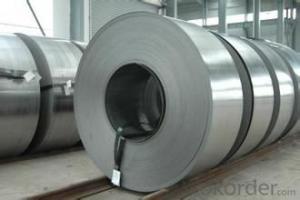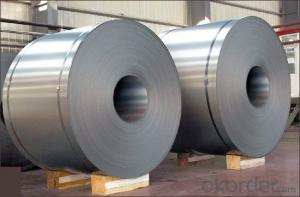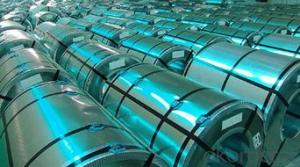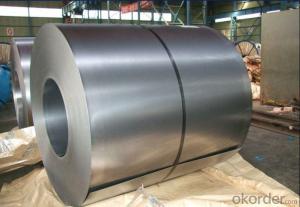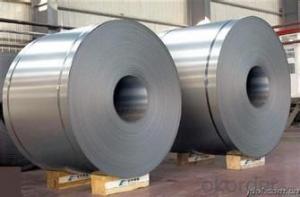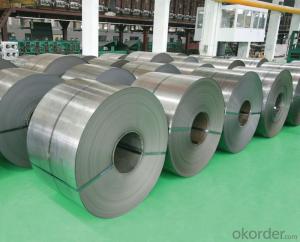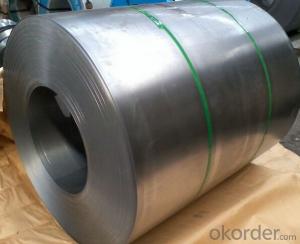Chines Best Cold Rolled Steel Coil in Good Price
- Loading Port:
- China main port
- Payment Terms:
- TT OR LC
- Min Order Qty:
- 50 m.t.
- Supply Capability:
- 10000 m.t./month
OKorder Service Pledge
OKorder Financial Service
You Might Also Like
Chines Best Cold Rolled Steel Coil in Good Price
1.Structure of Cold Rolled Steel Description:
The raw material of cold rolled steel coil/sheet is high quality hot rolled product, and after pickling continuous rolling, degreasing, annealing,skin pass,slitting and cut to length line etc. Along with it many kinds of new technology and new process of global cold rolling production have been applied. Therefore the quality of the goods could be guaranteed. The product is widely used in outdoor and interior decoration, furnishing manufacturing, home appliance, automobile etc.
2.Main Features of the Cold Rolled Steel:
• Excellent process capability
• Smooth and flat surface
• Workability, durability
• Excellent heat resistance performance
• High strength
• Good formability
• Good visual effect
3.Cold Rolled Steel Images
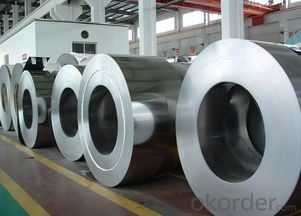
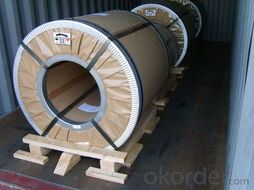
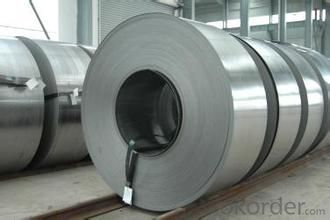
4.Cold Rolled Steel Specification
Standard:AISI,ASTM,DIN,GB,JIS,JIS G3302 ASTM 653M EN10142
Grade: Q195~Q345
Thickness: 0.16mm~2.0mm
Width: 1250mm MAX
Coil weight:3-12 MT
Coil ID:508/610mm
Chemical composition:
C | Si | Mn | Cr | Ni | P | S |
0.150 | 0.476 | 11.231 | 12.50 | 0.900 | 0.039 | 0.010
|
5.FAQ of Cold Rolled Steel
1.How to guarantee the quality of the products?
We have established the international advanced quality management system,every link from raw material to final product we have strict quality test;We resolutely put an end to unqualified products flowing into the market. At the same time, we will provide necessary follow-up service assurance.
2. How long can we receive the product after purchase?
Usually within thirty working days after receiving buyer’s advance payment or LC. We will arrange the factory manufacturing as soon as possible. The cargo readiness usually takes 15-25 days, but the shipment will depend on the vessel situation.
- Q: I noticed a friend's appliances are not magnetic, and mine are. Both are stainless steel. Are there two types of stainless steel or something? Thanks
- Some stainless steel are magnetic and some aren't. The real high grade stainless steels aren't magnetic.Stainless is just regular steel with varying degrees of nickel and chromium alloys mixed in the batch. The more nickel and chromium the less likely to be magnetic. A lot of stainless exhaust pipes and barbecue grills claim to be stainless, and yet they still rust and tend to be magnetic. They must use the bare minimum of nickel and chromium in the melted batch just to claim the title of stainless steel. Nickel and chromium are quite expensive and they are what gives the steel the anti-corrosion and extreme hardness characteristics along with loss of magnetism of the steel. If you have stainless steel that is magnetic , it is a good sign it is stainless steel that barely meets the criteria of true stainless steel.
- Q: What are the different types of edge conditions in steel coils?
- There are several types of edge conditions in steel coils, including mill edge, slit edge, rounded edge, deburred edge, and trimmed edge.
- Q: Building the bulwurk, general use on trawlers. What kind of steel is best suited.
- How big is your trawler going to be and what use, The ones you see off the Alaska Coast or a Gulf Coast Shrimper? My preference in today's economy would not make sense and that is Aluminum.....not steel at all, maybe even Fiberglass, but $$$$ talk so Steel is cheaper, but you need to know what you are doing. The designer of the hull should have specified the right /preferred grade. It today's world there are many more choices available. You use a mild steel, most often grade A or B, but some applications call for grade D. Check your blue prints and list of materials. Edit. Ok I understand. There are 2 ways to go. One is use a relatively cheep steel and use higher cost epoxy primers and paint, often requiring special surface preparation just before priming, or two, using a much higher cost steel with more chrome and nickel in it. Grades that begin with #3xxx These are weldable with rods that are available, and can be welded directly to mild steels. However these are 3X the cost. If your a Shrimper, I'm guessing gulf coast. I worked with several boat yards in the 70's installing spray urethane foam for insulating there holes. So I've been around lots of small yards from Florida to Texas. I'd call the nearest steel warehouse and ask what they would recommend. You might find what you want at a scrap yard. I've lucked out several times picking up 1/4 plate scrap$ and I'd bet the scrapyard guy would know just what you need. I know there are places to get what you need in Mobile and New Orleans. Good luck!
- Q: How do steel coils contribute to sustainability in construction?
- Steel coils contribute to sustainability in construction in several ways. Firstly, steel is a highly durable and long-lasting material, which means that structures built using steel coils have a longer lifespan and require fewer repairs and replacements. This reduces the overall environmental impact associated with construction activities. Additionally, steel is a highly recyclable material, with most steel coils containing a significant amount of recycled content. This promotes a circular economy and reduces the demand for new raw materials. Moreover, steel coils are lightweight and versatile, allowing for more efficient transportation and installation, thereby reducing energy consumption and emissions during construction. Overall, the use of steel coils in construction promotes sustainability by offering durability, recyclability, and energy efficiency.
- Q: What are the different methods of coil leveling?
- There are several methods of coil leveling that are commonly used in various industries. These methods include: 1. Roller leveling: This method involves passing the coil through a series of rollers that apply pressure and gradually flatten the coil. The rollers can be adjusted to apply varying levels of pressure, allowing for precise control over the leveling process. 2. Stretch leveling: In this method, the coil is subjected to tension forces that elongate the material and remove the internal stresses. The coil is passed through a series of rollers while being stretched, which results in a more uniform and flat surface. 3. Temper leveling: This method involves heating the coil to a specific temperature and then cooling it rapidly. The rapid cooling process helps to equalize the stresses within the coil and improve its flatness. Temper leveling is often used for high-strength steels. 4. Roller leveling with leveling rolls: This method uses additional leveling rolls that are positioned above and below the main leveling rollers. The leveling rolls apply pressure to specific areas of the coil to correct any unevenness or distortions. 5. Tension leveling: This method involves applying tension to the coil while it is being processed. The tension helps to straighten and flatten the material, resulting in a more even and flat surface. 6. Precision leveling: This method is used for high-precision applications where extremely flat and uniform coils are required. Precision leveling involves a combination of roller leveling, stretch leveling, and other corrective measures to achieve the desired level of flatness. Each of these methods has its own advantages and limitations, and the choice of method depends on factors such as the type of material being leveled, the required flatness tolerance, and the intended application of the coil.
- Q: What are the different surface finishes of steel coils?
- There are several different surface finishes of steel coils, including mill finish, galvanized finish, painted finish, and coated finish.
- Q: I know there is soft steel and sturdier steel they use in products. The sturdier often used for equipment that requires more durability when in operation.
- It kind of depends on the application. It can be anywhere from simple to very difficult depending on what exactly you are talking about. Hardening a small piece of carbon tool steel for a chisel or punch consists of simply heating it till its red hot and then quenching it in water. This is done after the tool is formed. Hardening also means making the steel brittle, so it must be tempered after hardening to make it hard and strong. Hardening large or huge pieces like that used for equipment is done at the foundry, where they have equipment to do such a job.
- Q: Why do we galvanise steel? Galvanised steel is steel coated with zinc.
- Keeps it from rusting. Zinc doesn't rust like steel does.
- Q: How do steel coils contribute to the sustainability of construction projects?
- There are several ways in which steel coils contribute to the sustainability of construction projects. First and foremost, steel is a highly durable and long-lasting material. Manufactured to withstand extreme weather conditions, corrosion, and other external factors, steel coils are ideal for construction projects that require strength and longevity. This durability reduces the need for frequent repairs and replacements, resulting in minimized waste and resource consumption over time. Moreover, steel coils are recyclable. Once their lifespan in a construction project comes to an end, steel coils can be easily and efficiently recycled. This recycling process requires less energy compared to the production of new steel, leading to reduced carbon emissions and environmental impact. Furthermore, the recycled steel can be utilized in various industries, including construction, thereby promoting sustainability and resource conservation. Additionally, steel coils contribute to the sustainability of construction projects by offering design flexibility. Being a versatile material, steel can be easily shaped, cut, and molded into different forms and sizes. This allows for efficient construction practices, reducing material wastage and optimizing resource utilization. Furthermore, the lightweight nature of steel coils enables convenient transportation and installation, further decreasing fuel consumption and associated greenhouse gas emissions. Lastly, steel coils contribute to the sustainability of construction projects through their energy efficiency. Being an excellent conductor of heat and electricity, steel is ideal for energy-efficient buildings. By incorporating steel coils into the construction of walls, roofs, and other components, buildings can be effectively insulated, resulting in reduced energy consumption for heating and cooling. Consequently, occupants benefit from lower energy bills, while the overall carbon footprint of the construction project is reduced. In conclusion, steel coils contribute to the sustainability of construction projects through their durability, recyclability, design flexibility, and energy efficiency. By utilizing steel coils, construction projects can minimize waste, conserve resources, reduce environmental impact, and optimize energy consumption, thereby promoting a more sustainable and eco-friendly approach to construction.
- Q: How do steel coils contribute to the manufacturing of HVAC systems?
- Steel coils are used in the manufacturing of HVAC systems primarily for their strength and durability. They form the core structure of various components such as heat exchangers, condenser coils, and evaporator coils. The steel coils provide stability and support, ensuring the longevity and efficiency of HVAC systems by withstanding high temperatures, pressure, and constant use.
Send your message to us
Chines Best Cold Rolled Steel Coil in Good Price
- Loading Port:
- China main port
- Payment Terms:
- TT OR LC
- Min Order Qty:
- 50 m.t.
- Supply Capability:
- 10000 m.t./month
OKorder Service Pledge
OKorder Financial Service
Similar products
Hot products
Hot Searches
Related keywords
